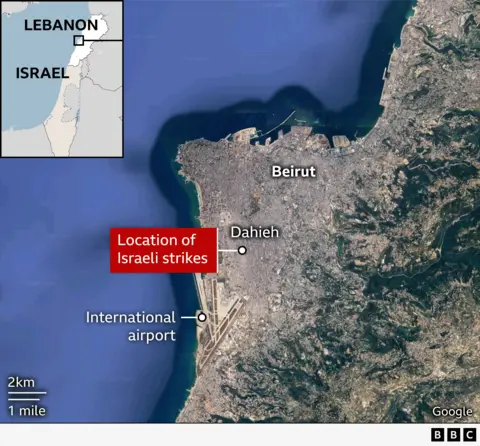Israel carried out several airstrikes in Beirut and southern Lebanon, including on branches of a Hezbollah-linked bank.
Explosions were heard in southern Beirut’s Dahieh district, an area controlled by Hezbollah, as well as in the Bekaa Valley and southern Lebanon. It is not known if there were any casualties.
The Israeli army earlier warned residents of more than 20 areas in Lebanon, including 14 in the capital Beirut, that it planned to strike overnight.
The Israel Defense Forces (IDF) also said they were targeting banks and other financial infrastructure that support Hezbollah.
In a statement on Sunday evening, IDF spokesman Rear Adm Daniel Hagari warned that “anyone who is near sites used to finance Hezbollah’s terrorist activities should leave these locations immediately”.
“We will be hitting several targets in the coming hours and additional targets throughout the night,” he said.
“In the coming days, we will reveal how Iran finances Hezbollah’s terrorist activities by using civilian organizations, associations and NGOs that act as fronts for terrorism,” the Israeli spokesman added.
Lebanon’s state-run news agency NNA announced strikes at bank branches of Al-Khart Al-Hassan Association, including in the eastern Bekaa Valley.
It also reported that the strike took place at the bank’s branch near Beirut’s Rafik Hariri International Airport. A plume of smoke followed the explosion near the airport.
The bank has more than 30 branches across Lebanon, including two in central Beirut.
Israel accuses it of funneling Iranian money to the group to buy and stockpile weapons and pay its members. The company has been under US sanctions since 2007 and is accused by US authorities of being a cover for Hezbollah to manage its financial activities.
It also provides services to the public in some parts of the country where the group has strong support.
Meanwhile, Hezbollah said it fired more rockets at Israel on Sunday, targeting military bases. It also said it fired on Israeli troops in southern Lebanon.

As of Sunday evening, the IDF had fired dozens of projectiles — usually meaning rockets — at northern Israel in the past 24 hours.
It also said its warplanes “conducted an intelligence-based attack on the command center of Hezbollah’s intelligence headquarters and an underground weapons workshop in Beirut.”
It said measures had been taken to “minimize the possibility of civilian casualties”.
Israel has been accused by Hezbollah and Lebanese officials of targeting civilians, which it denies.
On Sunday, the United Nations Interim Force in Lebanon (Unifil) accused the IDF of deliberately demolishing a watchtower and the perimeter fence of a UN position in the southern Lebanese town of Marwahin, which borders Israel. This follows similar incidents in recent weeks.
“Once again, we note that violating the UN position and causing damage to UN property is a flagrant violation of international law and Security Council Resolution 1701,” UNIFIL said in a statement.
In a separate development, the Lebanese army said three soldiers were killed when an Israeli airstrike hit a military vehicle in Nabadi, southern Lebanon.
Israel has not yet commented on the two incidents.
Lebanon’s army has historically stayed out of cross-border clashes between Israel and Hezbollah – but many of its troops have been killed in Israeli attacks since last month’s escalation.
Hezbollah – Lebanon’s most powerful militant group – says it is firing on Israeli positions in the Gaza Strip in solidarity with Hamas.
Both Hezbollah and Hamas are supported by Iran.
Lebanese authorities estimate that more than 2,400 people have been killed in Lebanon in the past year. Israel says 59 people were killed in northern Israel and the occupied Golan Heights during the same period.